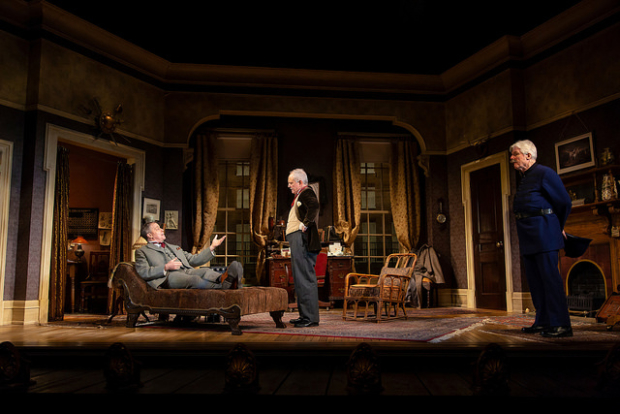Sherlock's Last Case Offers a Different Kind of Holmes Mystery
The famed detective of the proverbial nine lives returns to the stage.

(© T. Charles Erickson)
Sherlock Holmes refuses to be forgotten, despite the passage of years and newer ways to investigate crimes meant to surpass superhuman ingenuity. Sprung from the imagination of Sir Arthur Conan Doyle and revealed in 56 stories and four novels between 1887 and 1927, the detective is ever more with us, on film, television, and in the theater, striding the boards in his familiar deerstalker hat and caped overcoat.
Playwright Charles Marowitz brought Holmes to the stage in 1984 with Sherlock's Last Case, now running in revival at the Huntington Theatre Company. Directed by Maria Aitken, the play has all the conventional trappings of the tradition, including the period setting, but Marowitz has attempted to dig deeper into the characters, making their relationships determine the plotline. This is not your usual Sherlock Holmes mystery, however closely Marowitz has stuck to the details.
The play revolves around the appearance of two children, previously unknown, fathered by arch villain Professor Moriarty, whom Holmes vanquished when they fell over a waterfall. Through a series of hand-delivered letters, the son threatens the life of Holmes (Rufus Collins), while his partner, the devoted Dr. Watson (Mark Zeisler), looks on, worries, and offers his advice. In true Holmes fashion, Watson's opinions are run over as "elementary" while the detective determines his response.
The pot is stirred by the arrival of the lovely Liza Moriarty (Antoinette Robinson), who fears for the rage of her twin brother, not to mention Holmes's safety. The cast of characters is completed by Mrs. Hudson, Holmes's loyal housekeeper (Jane Ridley), and the bumbling Inspector Lestrade (Malcolm Ingram), determined to protect him.
One major problem with this revival is the script itself, which reads better than it plays. The characters are saddled with long stretches of exposition in the form of heartfelt monologues to each other, but meant to recall background information. Marowitz has structured the work as a 19th-century "well-made play," depending on a series of significant letters, plus amazing coincidences that move the plot along. The long, slow build-up to the surprise turn of events at the end of Act 1 opens the show, bookended by an overstuffed countdown to the final curtain. When there are laughs, based mainly on the audience's recognition of past exploits by Holmes, or references to his highly developed narcissist personality, they are dropped in but unconnected to the action.
The acting ensemble is good enough, but watching them play these beloved characters is not as satisfying as reading about them. Ridley and Robinson come off best, the former conveying the housekeeper's antic but fraying loyalty, the latter exuding youthful charm as Liza Moriarty. Collins and Zeisler get the outlines right for Holmes and Watson, but never risk bringing their own distinctive touches to these iconic roles. Aitken, who delivered such spot-on direction for the Huntington production of Alfred Hitchcock's The 39 Steps, here hews to a conventional approach rather than pumping up the suspense. The matter-of-fact emotional reactions from the actors are as languid as the pacing.
The work of the designers is the most memorable aspect of the show, especially Hugh Landwehr's re-creation of Holmes's lodgings at 221B Baker Street and Fabio Toblini's period costumes. Landwher's set also includes a spooky second locale, totally different and magically retractable as needed. However, those expecting a pleasurable night out in the company of this master detective and his loyal sidekick will be sorely disappointed by this forgettable outing of Sherlock's Last Case.








